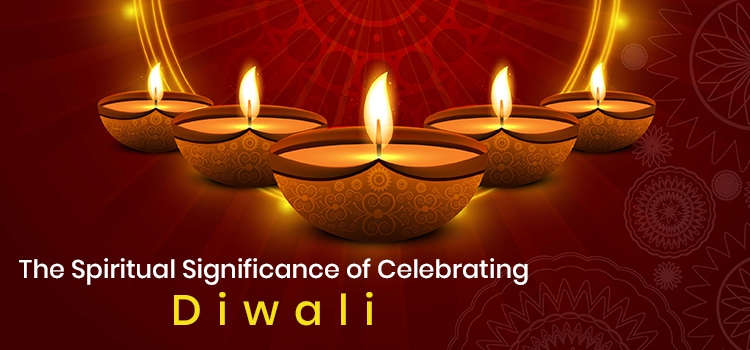The Spiritual Significance of Celebrating Diwali
Most people know that Diwali is a time for celebration and merrymaking. But not many are aware that this festival of lights has a spiritual significance, too. Hindu mythology has many stories that are associated with the origin of Diwali. For example, one tradition links the festival to events in the Ramayana, a Hindu epic. Thus, people believe that Diwali commemorates the victorious Rama’s return to his kingdom, Ayodhya, after killing Ravana, the demon king of Sri Lanka, who had kidnapped his wife, Sita. As Rama, Sita, Lakshmana, and Hanuman reached Ayodhya after Rama’s 14-year exile, the people of his kingdom are said to have welcomed him with great fanfare, and they even placed lighted lamps all along his route to show their happiness. Hence, Diwali signifies the triumph of good over evil. Yet another belief is that it celebrates Krishna’s slaying of the demon, Narakasura, during the Dwapara Yuga period.

The Mythology behind Diwali:
An older story has it that Goddess Parvati played dice with Shiva on this day, so people engage in gambling during Diwali, and it is not considered as a sinful act on this day. Apart from celebrating the victory of good over evil, Diwali is also an occasion to invoke the blessings of Goddess Lakshmi, who bestows wealth and good fortune. Women perform Lakshmi Pooja at home during this time for appeasing Goddess Lakshmi and getting her blessings for overall prosperity and abundance. They also buy jewelry and household appliances at this time and give their houses a fresh coat of paint. There is a story that Lakshmi emerged from the Milky ocean during Samudra Manthan on this day, while another claims that on the night of Diwali, Lakshmi wed Vishnu. Such accounts can be found in the Puranas, specifically the Padma Purana.
Diwali is also celebrated in countries like Kenya, Nepal, Malaysia, Trinidad, England, the US, and many more where there is a sizeable population of Hindus. People light lamps, burst crackers, and eat sweets on Diwali. They also wear new clothes and buy household appliances, cars, jewelry, etc. As it is an auspicious day, some people launch their businesses on this day.
The Spiritual Significance of Diwali:
Diwali or Deepavali means ‘row of lights’, the reason why it is called the festival of lights. Light represents knowledge, joy, and divinity, while darkness represents ignorance, sorrow, and evil. A brightly lit room evokes feelings of happiness and optimism, while a dark room makes us feel fearful and sad. The ancient sages talked about the inner light within us, which has the ability to give us happiness, health, and prosperity. But it also represents the divinity within us. This inner light can dispel all the darkness in our lives.
In the Upanishads, we come across the words, “Tamassoma Jyotirgamaya”, which mean, “From darkness, lead us into light.” The Buddha wanted those who sought Truth to be lamps unto themselves. In Tibetan Buddhism, "Om Mani Padme Hum", a mantra, means “the jewel (light) lies within the lotus (self). And in Psalm 18:28 of the Bible, it says, “the Lord will light my candle so that it shall shine full bright”. In hatha yoga, the kundalini is said to awaken when the inner chakras are lit up one by one through austerities and by invoking the inner Shakti. And then, of course, there is the Gayatri mantra, which speaks of the Sun as the power that removes all darkness. It is evil and good within us, and by lighting up the good within us, we can dispel the evil within us. And we need to spread the light within us to those around us as well. This is why people light the central lamp first during Diwali, and it is then used to light all the other lamps.
Once we locate our inner Self, all our other faculties will be lit. To know real happiness, we need to know our Self first, after which we will be able to spread the light of happiness to others. Before we try to set right the world, we must take a close look at ourselves. If not, we will run into problems. The failure to do so is what led to the downfall of Kamsa and Ravana.
The spiritual significance that underpins Diwali is that we need to light up our inner selves first if we wish to dispel the darkness within as well as the darkness without.



















